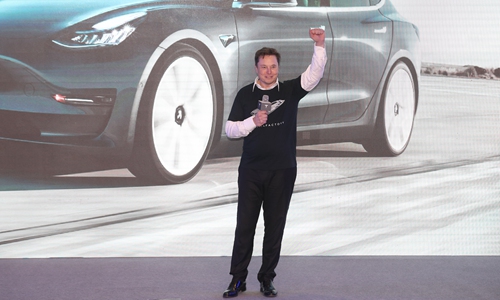Tesla Shanghai success is macrocosm of China Inc.
Source: Global Times Published: 2020/10/26 21:11:26

Tesla Inc CEO Elon Musk attends a delivery event for China-made Model 3 cars in Shanghai, China on January 7. Photo: cnsphoto
Tesla has achieved another milestone success at its Shanghai Gigafactory, which officially announced on Monday the launch of its vehicle export business, with the first batch of domestically made Tesla Model 3 cars to leave on Tuesday for European countries like Germany, France and Italy.Against the backdrop of an increasingly complex geopolitical setting, Tesla's robust performance in Chinese market is sufficient to indicate that the country's real appeal for foreign corporations lies in its manufacturing strength, which is on track to move up the global value chain.
To some extent, Tesla's Shanghai factory is at the core of its global development strategy in terms of both production and profitability. The US-based automaker has increased production capacity at the Shanghai Gigafactory to 250,000 units per year, meaning that it has extra capacity for other markets besides meeting Chinese consumers' demand.
And, despite the high tariffs for imported cars in Europe, Model 3 units produced in China can still bring Tesla considerable profits due to the facility's relatively low production costs.
Since the launch of the Shanghai Gigafactory, Tesla's local success story has repudiated those biased while self-righteous conspiracy theories, which always hype up China's supply chain crisis.
It is true that a small number of multinational companies are evaluating the potential impact of the US-China political tensions on their supply chains. Last week, the chair of PwC US, Tim Ryan, said in an interview that companies would continue to shift supply chains out of China regardless of the result of the US presidential election in November, according to a CNBC report.
Also, there is no denying, as land and labor costs are keeping growing in China, some companies are relocating their manufacturing plants to Southeast Asia. These are natural changes when China's economic development has reached a higher level, with its comparative advantages evolving to include a huge market, comprehensive industrial system, sound infrastructure foundation, and R&D capability.
China owns a complete industrial system that makes it the only country in the world to encompass all the categories listed in the UN's industrial classification.
Against this backdrop, those engaged in advanced manufacturing sectors, instead of leaving, are actually being attracted to China's huge market. Tesla is a prime example.
China's social stability and effectiveness in fighting the coronavirus pandemic, as well as China's relatively complete industry chain, has enabled Tesla to maintain fast vehicle production. By contrast, Tesla's factory in the US was struggling to increase capacity even before the pandemic broke out there.
Despite growing US-China tensions, these comparative advantages still make China a market that cannot be easily ditched by foreign companies. While some politicians from the US or other Western governments will continue to pursue a manufacturing decoupling from China, other multinational companies will immediately fill in up the void.
Posted in: GT VOICE